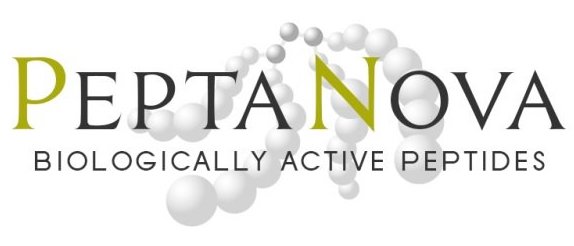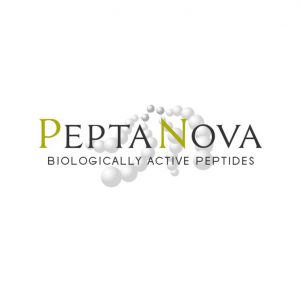Kisspeptin-10 (Rat) / Metastin (Rat, 43 – 52)
KiSS-1 Gene Product (Rat, 110-119 Amide),
4453-v 0.5 mg | 60.00 EUR
Tyr – Asn – Trp – Asn – Ser – Phe – Gly – Leu – Arg – Tyr – NH2
| (M.W. 1318.4) | C63H83N17O15 |
Synthetic Product
The purity of Kisspeptin-10 (Rat) / Metastin (Rat, 43 – 52) is guaranteed to be higher than 99% by HPLC
Ligand for hOT7T175 / GPR54
Metastasis suppressor gene KiSS-1 encodes a peptide with multiple biological functions such as inhibition of cancer metastasis, reproduction and vasoconstriction. In human and rat, the encoded mature peptide is composed of 54 and 52 amino acid residues, respectively, which is named Metastin or Kisspeptin. Kisspeptin-10 (Human) / Metastin (Human, 45 – 54) is an active segment of the human peptide from the C-terminal portion and is already available from our catalog.
Very recently, in collaboration with Dr. Tsukamura and her collegues in Nagoya University, Peptide Institute has successful clarified that the corresponing rat 10-residue peptide, Kisspeptin-10 (Rat) / Metastin (Rat, 43 – 52) excerts the lutenizing hormone (LH) releasing activity in male rats. Actually intraerebroventricular or intravenously administration at a dose of 1 – 10 nmol/kg stimulates LH release and significiant increases plasma LH level in male rats.
Now the precise experiment using Kisspeptin-10 (Rat) / Metastin (Rat, 43 – 52) is possible in rat studies.
| Download: PDF-data-sheet |
| Download: PDF-manual |
Shipping | Storage | Stability
Our product Metastin | Kisspeptin-10 (Rat, 43 – 52) will be shipped at room temperature. Information about product specific storage conditions will be found on the vial. Stock solutions should be stored at -20°C. Please avoid repeated freezing and thawing by preparing aliquots.
References:
- T. Ohtaki, Y. Shintani, S. Honda, H. Matsumoto, A. Hori, K. Kanehashi, Y. Terao, S. Kumano, Y. Takatsu, Y. Masuda, Y. Ishibashi, T. Watanabe, M. Asada, T. Yamada, M. Suenaga, C. Kitada, S. Usuki, T. Kurokawa, H. Onda, O. Nishimura and M. Fujino, Nature, 411, 613 (2001) (Original; Metastin)
- M. Kotani, M. Detheux, A. Vandenbogaerde, D. Communi, J.-M. Vanderwinden, E. Le Poul, S. Brezillon, R. Tyldesley, N. Suarez-Huerta, F. Vandeput, C. Blanpain, S. N. Schiffmann, G. Vassart and M. Parmentier, J. Biol. Chem., 276, 34631 (2001) (Original; Kisspeptin)
- Y. Terao, S. Kumano, Y. Takatsu, M. Hattori, A. Nishimura, T. Ohtaki and Y. Shintani, Biochim. Biophys. Acta, 1678, 102 (2004) (Original; Rat Metastin)
- V. Pheng, Y. Uenoyama, T. Homma, Y. Inamoto, K. Takase, K. Yoshizawa-Kumagaye, S. Isaka, T.X. Watanabe, S. Ohkura, J. Tomikawa, K.I. Maeda and H. Tsukamura, J. Reprod. Dev. 55, 378 (2009) (Pharmacol)
- M.L. Gottsch, D.K. Clifton and R.A. Steiner, Peptides, 30, 4 (2009) (Review)
Note: Based on the nomenclature recommendation, we hereafter use the product name of “Kisspeptin / Metastin” for peptides derived from KiSS-1 gene.



